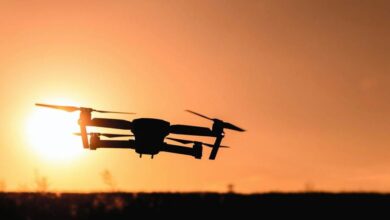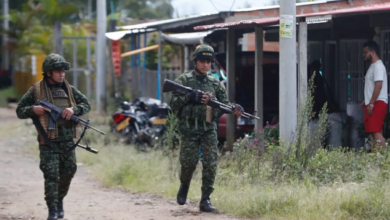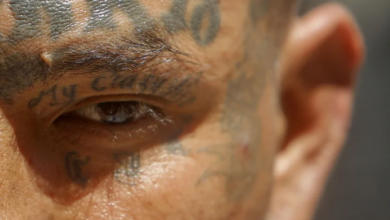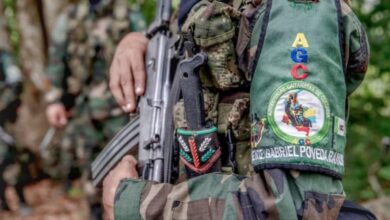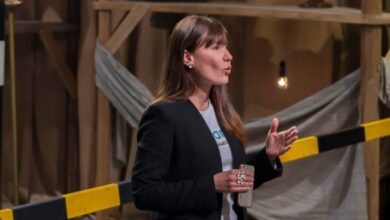Why are they killing social leaders in Colombia?
The State cares more about knowing the numbers of dead social leaders than identifying those responsible for their deaths

The murder of social leaders is increasingly frequent in Colombia. / Photo: REUTERS / Luisa Gonzalez – Archive
LatinamericanPost| Julieta Gutiérrez
Escucha este artículo
Leer en español: ¿Por qué están matando a los líderes sociales en Colombia?
As I walked through a maze of narrow streets, wet walls, and old houses; in which a mestizo town was subdued by the Spanish aristocracy for many years and which we know today as the Candelaria in the city of Bogotá; I was wondering why the armed groups that have existed in Colombia have chosen to silence anyone who tries to seek a collective good? Why have we become the assassins of our own history, of our own identity?
Who killed María del Pilar Hurtado? (A woman with a vocation for social transformation who was executed in cold blood in front of her children last year). Who killed Luis Soto? (A social leader who was killed in his home while quarantining during the current covid-19 pandemic). Who is responsible for the unacceptable deaths of more than 400 social leaders executed during the last 3 years?
“Los caparrapos”, from the Caparrapí Cundinamarca municipality; the ELN, the heirs of the FARC, the former "United Self-Defense Forces of Colombia (AUC)", who today call themselves the "Self-Defense Forces of Colombia (AGC)" or the "Gulf Clan"; because as the social leader Andrés Chica said, in an interview for the Semana magazine, "The paramilitaries continue to exist, they transform and change their names, but there they are."
There is also the "Águilas Negras" or "Black Eagles". An armed group that, although the Police Intelligence Directorate (DIPOL) has guaranteed its non-existence for years, thousands of pamphlets with threats to social leaders are signed with that name. And according to Camilo González Posso, Director of the Institute of Studies for Development and Peace (Indepaz), the name of “Águilas Negras” has become a social name used by various armed groups.
So, as there are so many signed threat pamphlets from the “Black Eagles” that could actually come from anyone, disinformation is created that ultimately goes nowhere.
Furthermore, why has the Colombian government not reacted to the early warnings of possible attacks against social leaders? What is the terrible crime that these human beings (Afro-descendants, trade unions, peasants, human rights lawyers, LGBTI populations and indigenous people) have committed so that they are extorted, threatened and executed left and right without any type of control?
Also read: Coronavirus: test are lacking in Latin America
Defending human rights, denouncing corruption, stopping illegal mining, fighting for land restitution, and going against illicit crops, are the "crimes" of which they have been accused by different armed groups.
And to look at this situation more closely, I walked through these historic streets and got to the place where I would conduct a short interview with a character who had confronted every armed group in order to regain the roots of his Inga people in Aponte Nariño or, as he also called it (with its real name), Tamabioy.
Hernando Chindoy, a spokesman for lives
Chindoy lived by obligation with the war breathing on the back of his neck because in that indigenous reservation located in the south of Colombia called Aponte or better said Tamabioy, there was not a day when someone was not killed. "They killed in front of the church, in front of the school, in the plaza, and that accumulates a lot of anger." This is because from approximately 86 to 2002 there was incessant violence by different armed groups causes by conflicts over illicit crops.
So at that time the young Chindoy, 25, decided to let himself be carried away by the fury of his youth to start a huge fight against every armed group (paramilitaries, military, police and guerrillas) that using terror and blood had invaded the lands of Tamabioy for the illicit cultivation of poppy. "As a young man, what I do is generate internal alliances and make the most of that accumulated pain that exists in those parents who had lost their children."
In the middle of this battle no one could be trusted anymore, because even the official authorities were also part of the corruption. "We went to the police to ask for their support, but then we found out that the commander had ties to paramilitaries and was on trial."
Also read: Coronavirus challenges Latin American governments
So the young Chindoy and his family decided to undertake a trip in search of neighboring towns (in cultural terms), specifically the Siona town, a town that lives below Puerto Asis Putumayo, to gather enough strength and find a way to recover the freedom of a people that the ambition of many had been stolen. "They taught us the values of confronting the guerrillas, of giving them 8 days to leave the territory. Because they had entered without asking our permission, killing people. We also did the same with paramilitarism and with the issue of the army and the police. ”
And through the speakers of the church, they took advantage of the masses to send the message of leaving the territory in 8 days to all armed groups. And with the union of all the people, in 2003 they reached the first agreement to eradicate the poppy. However, that achievement was not easy because on several occasions the leader Chindoy suffered attacks. "The bullets hit the walls and luckily nothing happened to me."
Thus, thanks to the care of its people, its guardians and its spiritual strength, Hernando Chindoy continues to fight and win wars against violence and illicit crops, with one of his projects called "Wasikamas" which means guardians of the earth. Because without a doubt the social leaders are guardians and representatives of a people in need of justice.

